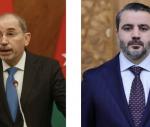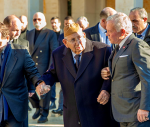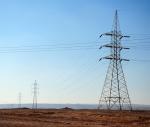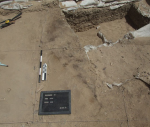You are here
IAEA chief heads to Iran as nuclear talks reach last stretch
By Reuters - Jul 01,2015 - Last updated at Jul 01,2015
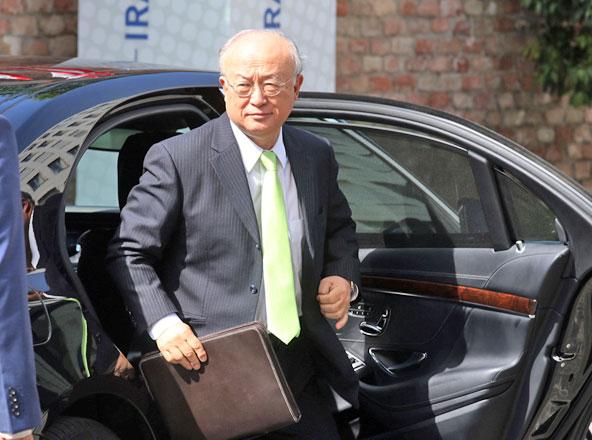
Director General of the International Atomic Energy Agency, IAEA, Yukiya Amano of Japan arrives at the Palais Coburg where closed-door nuclear talks with Iran take place in Vienna, Austria, on Tuesday (AP photo)
VIENNA — The global nuclear watchdog said on Wednesday its boss would fly to Tehran to discuss one of the biggest sticking points that need to be resolved so that Iran and world powers can reach a breakthrough final nuclear deal by a new deadline of next week.
Iran and six world powers gave themselves an extra week on Tuesday to reach an accord that would curb Tehran’s nuclear programme in exchange for relief from economic sanctions, after it became clear that a June 30 deadline would not be met. Despite the lapsed deadline, diplomats have given upbeat assessments of the prospects for a deal.
US Secretary of State John Kerry and Iran’s Foreign Minister Mohammad Javad Zarif held one-on-one talks on Wednesday.
“We have some very difficult issues, but we believe we are making progress and we are going to continue to work because of that,” Kerry told reporters. Zarif said the talks were making progress and would continue to do so.
Western countries suspect Iran of seeking the capability to make a nuclear weapon. Tehran says its programme is peaceful. The effort to resolve the dispute has led to the most intense diplomacy between the United States and Iran since Iranian revolutionaries stormed the US embassy in Tehran in 1979.
Among the main sticking points that remain to be resolved are issues that involve the UN nuclear watchdog, the International Atomic Energy Agency. The powers want guaranteed access by IAEA inspectors to Iranian military sites and a response to IAEA queries about Tehran’s past activities that may have been related to weapons research.
The global body said in a statement that its chief Yukiya Amano would meet Iranian President Rouhani and other senior officials on Thursday in Iran.
A senior Western diplomat said possible military dimensions of Iran’s past nuclear work — known to negotiators as “PMD” — was the focus of his trip.
“He is going especially for PMD,” the diplomat said. “We can imagine that this is a positive sign. The Iranians invited him.”
A final accord to resolve the stand-off would be a major policy achievement for both US President Barack Obama and Iran’s President Hassan Rouhani, but both presidents face scepticism from hardliners at home.
Obama said on Tuesday no deal would be agreed unless it blocked all Iranian pathways to developing a nuclear bomb, and ensured a robust monitoring system was in place.
Ministers and officials from the five UN Security Council permanent members — Britain, China, France, Russia and the United States — plus Germany have been negotiating with Iran in Vienna at late night sessions.
Red lines
A senior Iranian negotiator, Deputy Foreign Minister Abbas Araqchi, said of the Vienna talks: “There are still some issues that we have not been able to resolve but the atmosphere of the talks is positive.”
Western diplomats say they are nearing a resolution on access for the inspectors. Iranian officials maintain that military sites are off-limits due to a red line set by Supreme Leader Ayatollah Ali Khamenei, who wields more power than Rouhani, the elected president.
Iran has been accused of stonewalling the IAEA probe on its past activities, and Western officials have said some of the sanctions relief would depend on Iran’s cooperation.
But diplomats say Iran will be reluctant to open up to IAEA investigators until the punitive sanctions are lifted.
Rouhani said on Tuesday Iran would resume suspended atomic work if the West broke its promises.
In a positive sign for the talks, the IAEA reported that Iran had complied with a preliminary deal to reduce its low-enriched uranium stockpile. An IAEA report in May said the stockpile had increased above the required level, but the agency said Tehran had met a June 30 deadline to reduce it.
Deadline missed
Tuesday was also the official deadline to reach a long-term deal that would build on the preliminary agreement. With the prize tantalisingly close and the atmosphere seemingly positive, the week-long extension came as no great surprise.
A successful negotiation could help ease decades of hostility between Iran and the United States. But many US allies in the region, including Israel and Saudi Arabia, are sceptical.
The French and Chinese foreign ministers are due back in Vienna on Thursday, a French diplomatic source said. All the ministers are expected to meet on Thursday to take stock.
Several diplomats said most ministers would then depart Vienna hoping to reconvene over the weekend in a final push to secure an agreement before next Tuesday. Kerry and Zarif were expected to stay in Austria.
Diplomats have said the real deadline is not June 30 but July 9. If a deal is presented after that date, the US Congress would have the power to review it for 60 days rather than 30 days, adding to the risk a deal could unravel.
Related Articles
VIENNA — Iran and world powers gave themselves an extra week to reach a nuclear accord, extending a deadline due to expire on Tuesday, while
Iran has agreed to address some of the many long-held allegations that it conducted research into making nuclear weapons before 2003 and possibly since, the UN atomic watchdog said Wednesday.
Talks between the UN nuclear watchdog and Iran this week appear not to have substantively advanced an investigation into suspected atomic bomb research by Tehran, potentially dimming chances for a broader deal between the Iranians and big powers.






